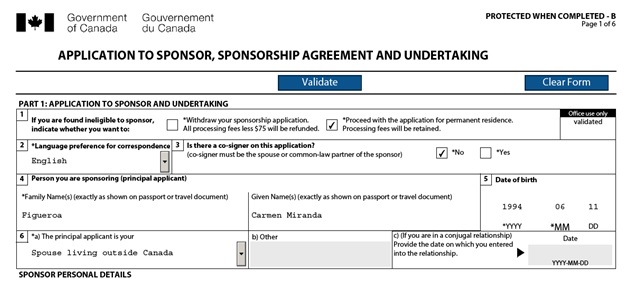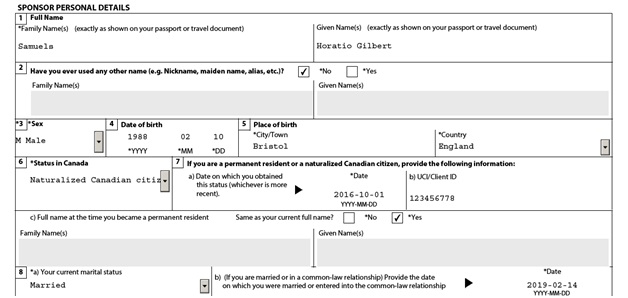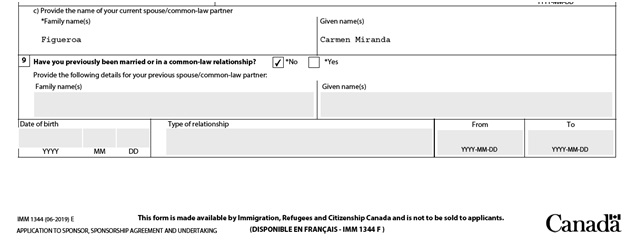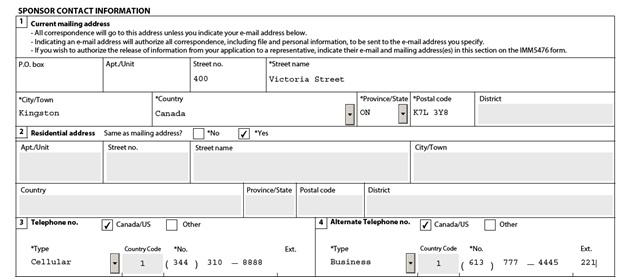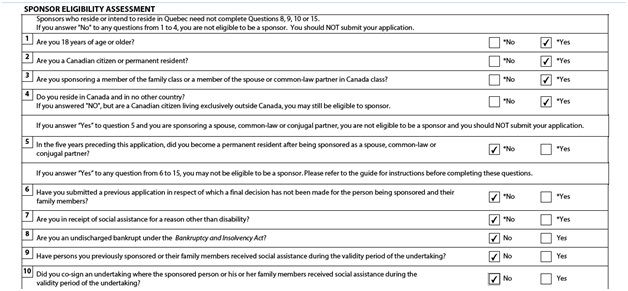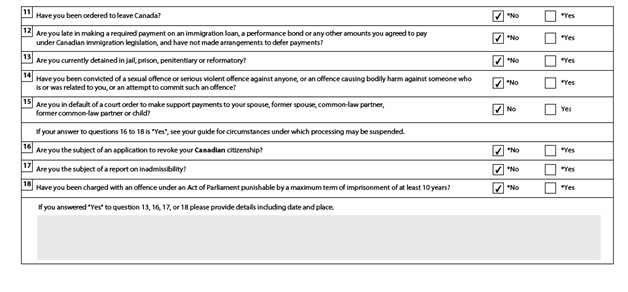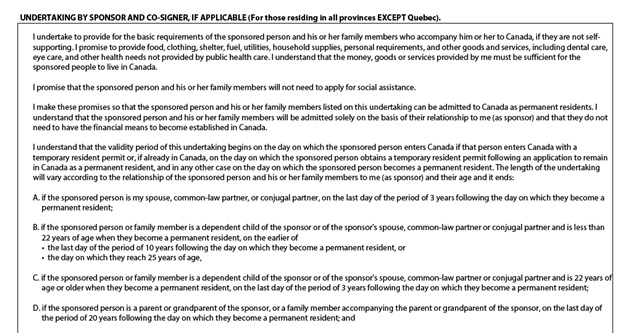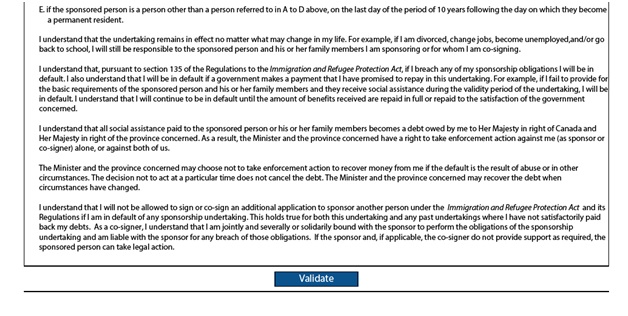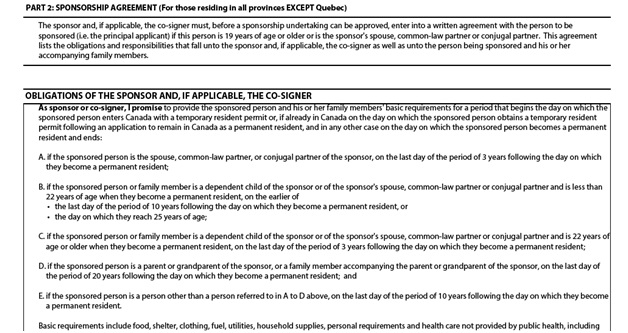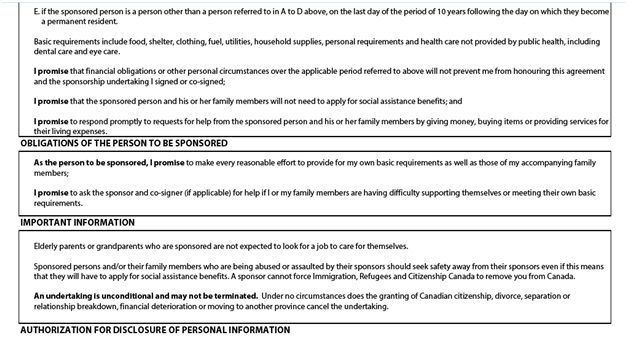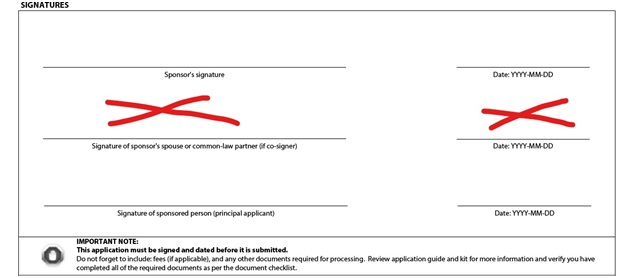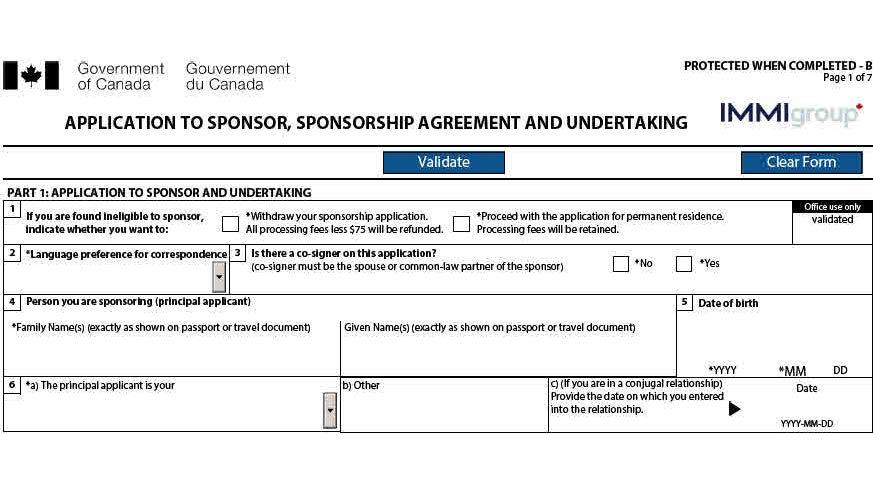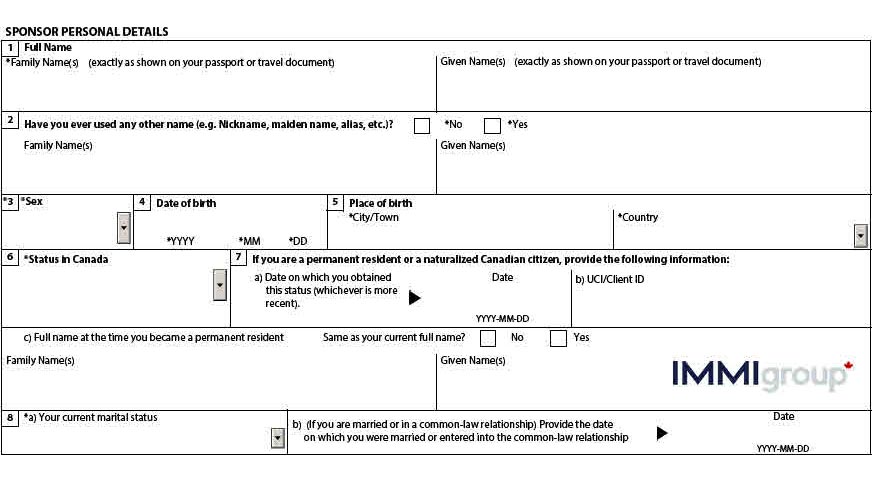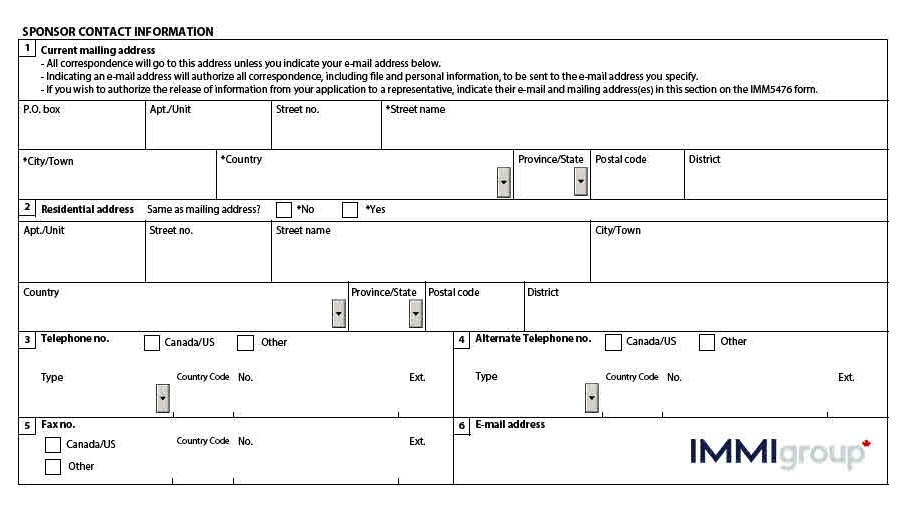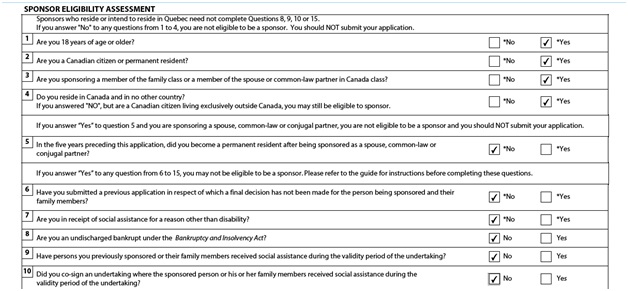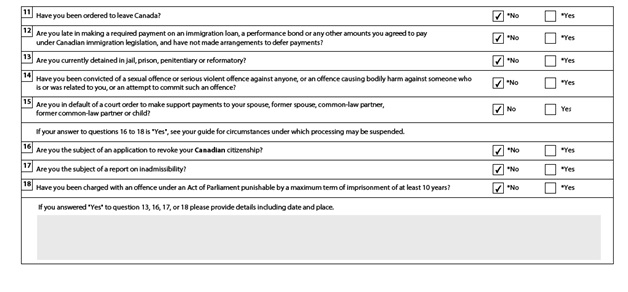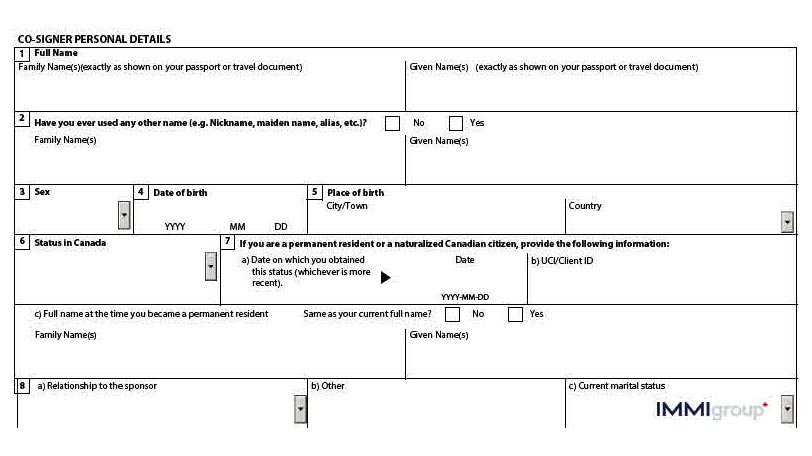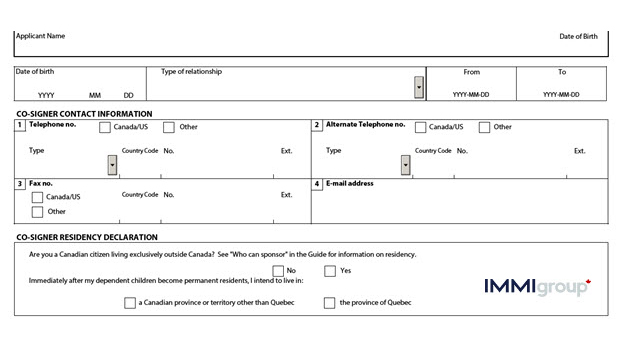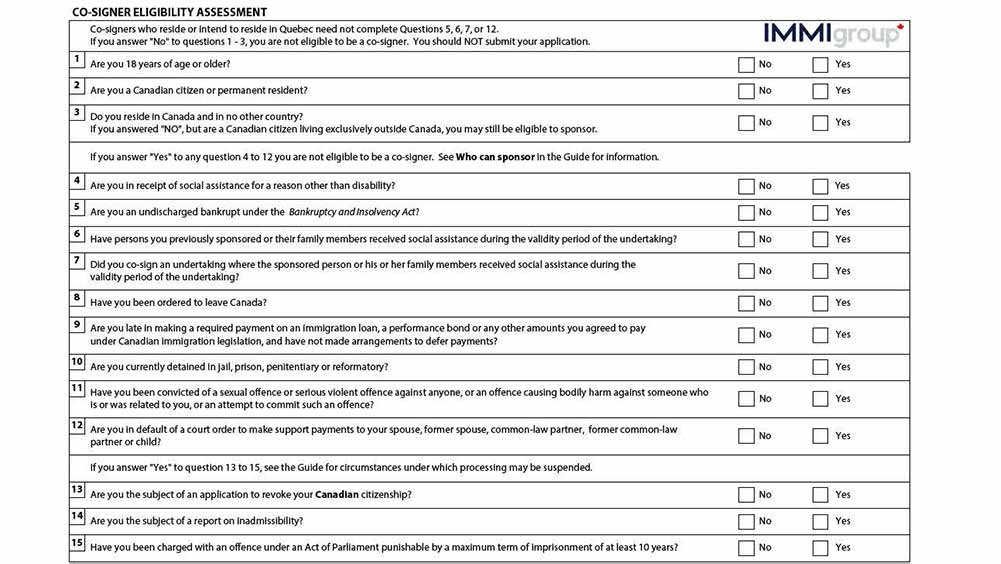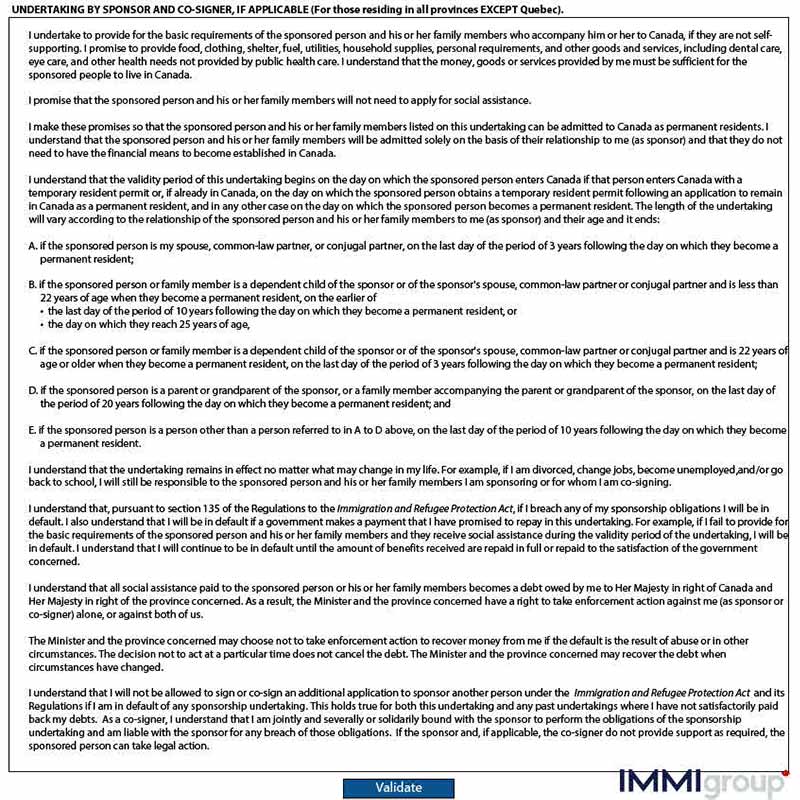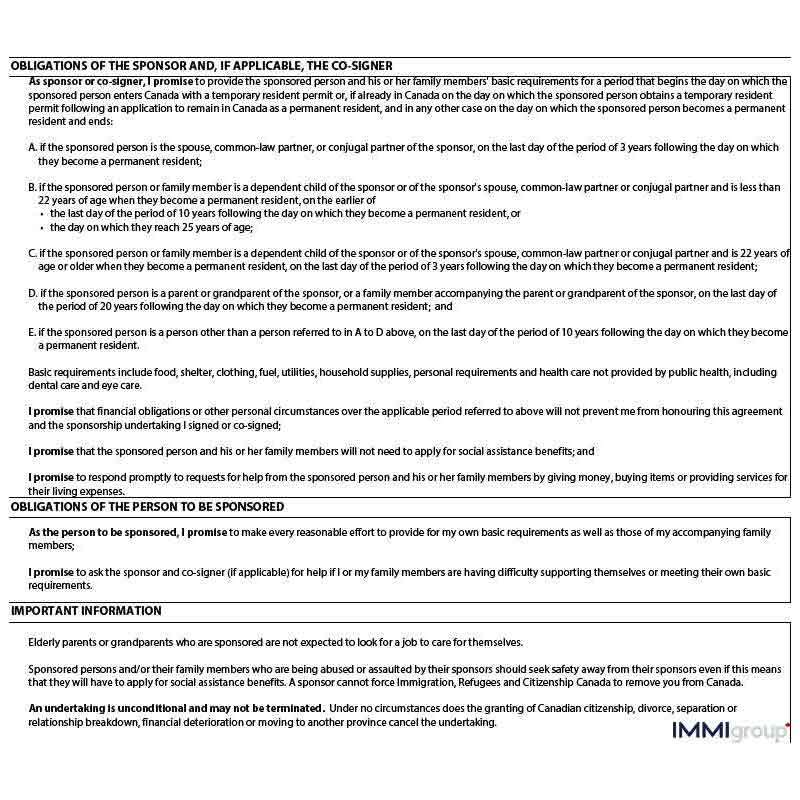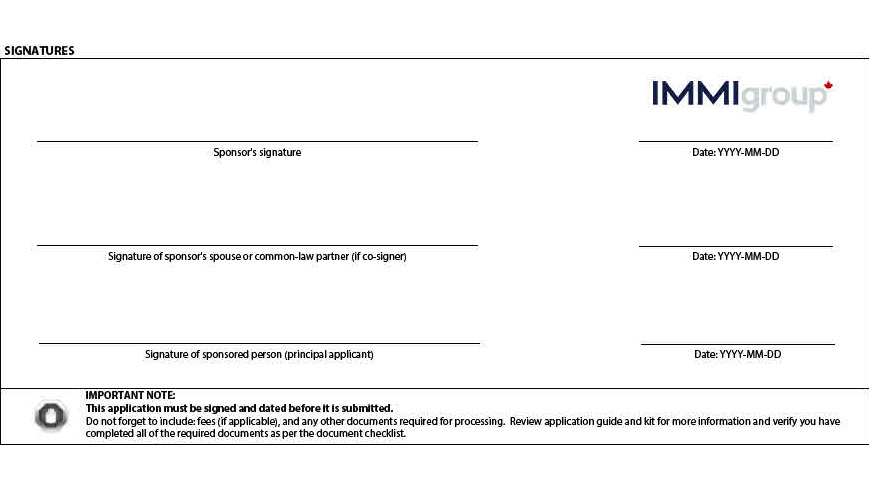Form IMM 1344 Application Sponsorship Agreement and Undertaking
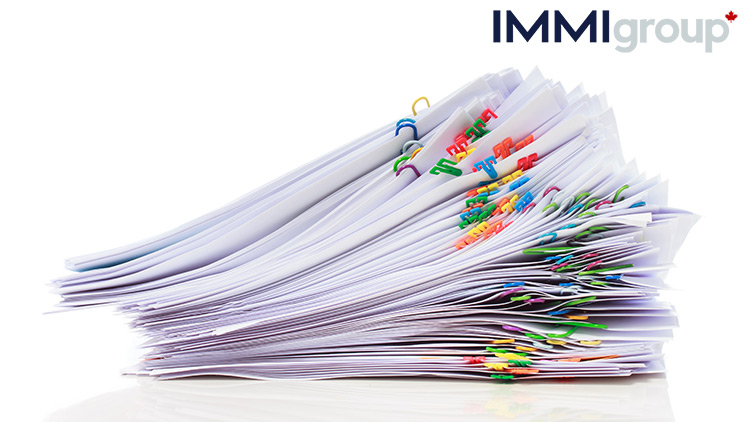
Form IMM 1344 Application to Sponsor, Sponsorship Agreement and Undertaking
This is the form where you give your personal information and your sponsored spouse/partner’s information to the government. Most importantly, you sign a declaration that you are assuming the responsibilities that are part of sponsoring a spouse/partner to Canada. The responsibilities are listed near the end of the form.
As well, if you have any previous or ongoing issues with IRCC – deportation orders, support payments not made for a previous sponsorship, any criminal convictions, etc. – you have to list them in the Sponsor Eligibility Assessment section.
In this example, we have kept the form simple and answered “No” to all those questions but answering “Yes” to any of those may cause your sponsorship to be deemed ineligible.
If you believe that you may have to answer yes to any of these questions, you should consider getting advice from an experienced immigration consultant or lawyer.
Completing the Application to Sponsor and Undertaking of the IMM 1344
Application to Sponsor and Undertaking Question 1
Question 1 asks you to choose an option in case you are deemed ineligible to sponsor your spouse/partner:
- Withdraw the application and get a partial refund, OR
- Proceed with the application and get NO refund.
Ineligibility Option 1: “Withdraw your sponsorship application. All processing fees less $75 will be refunded”
The first option is for if you will not be appealing any decision finding you ineligible to sponsor. It is the “safe/cautious” option. You might consider this if you have a history with IRCC that includes the following:
- Previous sponsorships that involved those sponsored going on social assistance, incurring a debt with the government that you haven’t repaid in full yet
- Missing payments on an immigration loan for things like transportation, assistance, or permanent residence fees
- Missing support payments to a spouse or child
- Not having paid into an agreed-upon performance bond
- You were sponsored to come to Canada within the last 5 years
- Any violent crimes against a long list of relatives (partners/spouses & their children, grandparents, parents, nieces, nephews, aunts, uncles, cousins … etc.).
Ineligibility Option 2: “Proceed with the application for permanent residence. Processing fees will be retained”
The second option is for if you are willing to appeal that decision. It may mean paying a lawyer or immigration consultant to handle the appeals process. This is the more “aggressive/assertive” option. Choose this option if you feel that the specific issue that made you ineligible to sponsor will soon be fixed by you. You should consult with a lawyer or immigration consultant to see the steps necessary to solve the issue (generally one of the ones listed above).
Application to Sponsor and Undertaking questions 2 through 6
For Question 2, your options are only English and French.
For Question 3 you should answer “No”. This is because you cannot have a co-signer if you are sponsoring a spouse, common-law partner, or conjugal partner.
Questions 4 & 5: Provide full name and date of birth of your sponsored spouse/partner.
Question 6: Choose the nature of your relationship with the person you are sponsoring, which in this case is one of the following 4 options:
- Spouse
- Common-law partner
- Conjugal partner
- Parent (if you are also sponsoring your child with the spouse/partner or their child).
If your sponsored spouse/partner will not be in Canada for the full application process then choose Spouse Living Outside Canada. If you are sponsoring a conjugal partner, then provide the date on which you met.
Please note: You will very likely have to provide more proof of your conjugal relationship in the case of a conjugal partner you are sponsoring.
As well, if you are a Canadian citizen living abroad with your sponsored spouse/partner you will have to provide proof that you intend to return to Canada and live in Canada with your spouse/ partner. Keep this in mind as you gather your documents further on in the application process.
If you are a permanent resident living abroad for work you cannot sponsor your partner until you return to Canada.
Completing the Sponsor’s Personal Details in the IMM 1344
Question 1: Make sure your name is exactly as shown in your passport. If you don’t have a family name then enter all your given names in the Given Names field(box).
Question 2: Only fill this in if you have had/used different names in the past (aliases, nicknames, maiden names etc.)
Question 4: Use an asterisk (*) if you don’t know your complete birth date: for example, 1992/*/03 if you are unsure of the month you were born.
Question 8: Make sure you write your current marital status (not previous ones). Go here for a list of the different marital status states. Remember to include the date:
- Of your marriage OR
- The date your relationship became common-law (this is NOT the same as the date you met).
How to Complete the Sponsor Contact Information on the IMM 1344
Enter your complete mailing address. (If you have different mailing and physical addresses, you need to ensure it is your mailing address.)
This is the address where your correspondence from IRCC will be sent unless you indicate an email address further below in the form. So, remember, if you do indicate an email address, look for any communication from IRCC in your inbox of that email address.
How to Complete the Sponsor’s Eligibility Assessment in the IMM 1344
This section of form IMM 1344 is key. Be very careful answering these questions because they deal with any outstanding issues you may have with IRCC that could cause you to be ineligible.
As we stated above, if you have a reasonable expectation that the issue or issues that may be resolved soon then go ahead and apply – but remember to check “Yes” if those issues are unresolved at the time you submit your application.
Sponsor eligibility questions:
- “Are you 18 years of age or older?” You must be at least 18 to sponsor your partner or spouse.
- “Are you a Canadian citizen or permanent resident?” Temporary residents cannot sponsor their partners/spouses. If you are temporary resident (visitor, student or worker) your spouse or partner should apply for an open work permit instead.
- “Are you sponsoring a member of the family class or a member of the spouse or common-law partner in Canada class?” We reviewed this distinction between inland and outland in Chapter 2.
- “Do you reside in Canada and in no other country?” We strongly recommend that sponsor live in Canada permanently before submitting a sponsorship application.
- “In the five years preceding this application, did you become a permanent resident after being sponsored as a spouse, common-law or conjugal partner?” If so, you are not yet eligible to sponsor your new spouse or partner.
- “Have you submitted a previous application in respect of which a final decision has not been made for the person being sponsored and their family members?” You cannot have two sponsorship applications in progress at the same time.
- “Are you in receipt of social assistance for a reason other than disability?” If yes, you are ineligible to sponsor your spouse or partner for PR.
- “Are you an undischarged bankrupt under the Bankruptcy and Insolvency Act?” If yes, you are ineligible to sponsor your spouse or partner for PR.
- “Have persons you previously sponsored or their family members receive social assistance during the validity period of undertaking?” If yes, you are ineligible to sponsor your spouse or partner.
- “Did you co-sign an undertaking where the sponsored person or his or her family members received social assistance during the validity period of the undertaking?” If yes, you are ineligible to sponsor your spouse or partner.
- “Have you ever been ordered to leave Canada?” Answering “yes” to this question does not necessarily make you ineligible, as it depends upon the circumstances of the order.
- “Are you late in making a required payment on an immigration loan, a performance bond or any other amounts you agreed to pay under Canadian immigration legislation, and have not made arrangements to defer payments?” If yes, you are ineligible to sponsor your spouse or partner for PR.
- “Are you currently detained in jail, prison, penitentiary or reformatory?” If yes, you are obviously ineligible to sponsor your spouse or partner. (And yes, Canada has too many names for jails.)
- “Have you been convicted of a sexual offence or serious violent offence against anyone, or an offence causing bodily harm against someone who is or was related to you, or an attempt to commit such an offence?” If yes, you are obviously ineligible to sponsor your spouse or partner.
- “Are you in default of a court order to make support payments to your spouse, former spouse, common-law partner, former common-law partner or child?” If yes, you are obviously ineligible to sponsor your spouse or partner.
- “Are you the subject of an application to revoke your Canadian citizenship?” If so, the processing of your sponsorship application may be suspended.
- “Are you the subject of a report on inadmissibility?” If so, the processing of your sponsorship application may be suspended.
- “Have you been charged with an offence under an Act of Parliament punishable by a maximum term of imprisonment of at least 10 years.?” If so, your application may be suspended. You should included details of the charge in the space provided.
If you do have to check “yes” to any issues, you may have to later prove to IRCC that these issues have been since resolved in order to show you are eligible to be a sponsor. As well, please understand that this could delay your application.
In other words, it is probably safer to wait until all those eligibility issues for your as a sponsor have been resolved before you apply to sponsor your spouse/partner. Of course, sometimes that may not be possible, and you wish to go ahead and apply before they are resolved. That decision is up to you.
What follows below is a list of the responsibilities you will undertake as a sponsor. You should review them and be familiar with them. When you sign and date this form, you are legally assuming responsibility for the sponsored person in a number of ways that could impact you if you later get divorced or if they seek social assistance, for example.
Undertaking by Sponsor and Co-Signer (if applicable) in the IMM 1344
Finally, the sponsor must agree to the following:
- “I undertake to provide for the basic requirements of the sponsored person and his or her family members who accompany him or her to Canada, if they are not self-supporting. I promise to provide food, clothing, shelter, fuel, utilities, household supplies, personal requirements, and other goods and services, including dental care, eye care, and other health needs not provided by public health care. I understand that the money, goods or services provided by me must be sufficient for the sponsored people to live in Canada.”
- “I promise that the sponsored person and his or her family members will not need to apply for social assistance.”
- “I make these promises so that the sponsored person and his or her family members listed on this undertaking can be admitted to Canada as permanent residents. I understand that the sponsored person and his or her family members will be admitted solely on the basis of their relationship to me (as sponsor) and that they do not need to have the financial means to become established in Canada.”
- I understand that the validity period of this undertaking begins on the day on which the sponsored person enters Canada if that person enters Canada with a temporary resident permit or, if already in Canada, on the day on which the sponsored person becomes a permanent resident. The length of the undertaking will vary according to the relationship of the sponsored person and his or her family members to me (as sponsor) and their age and it ends:
- if the sponsored person is my spouse, common-law partner, or conjugal partner, on the last day of the period of 3 years following the day on which they become a permanent resident;
- if the sponsored person or family member is a dependent child of the sponsor or of the sponsor’s spouse, common-law partner or conjugal partner and is less than 22 years of age when they become a permanent resident, on the earlier of
- the last day of the period of 10 years following the day on which they become a permanent resident, or
- the day on which they reach 25 years of age,
- if the sponsored person or family member is a dependent child of the sponsor’s spouse, common-law partner and is 22 years of age or older when they become a permanent resident, on the last day of the period of 3 years following the day on which they become a permanent resident;
- if the sponsored person is a parent or grandparent of the sponsor, or a family member accompanying the parent or grandparent of the sponsor, on the last day of the period of 20 years following the day on which they become a permanent resident, and
- if the sponsored person is a person other than a person referred to in A to D above, on the last day of the period of 10 years following the day on which they become a permanent resident.”
- “I understand that the undertaking remains in effect no matter what may change in my life. For example, if I am divorced, change jobs, become unemployed, and/or go back to school, I will still be responsible to the sponsored person and his or her family members I am sponsoring or for whom I am co-signing.”
- “I understand that, pursuant to section 125 of the Regulations to the Immigration and Refugee Protection Act, if I breach any of my sponsorship obligations I will be in default. I also understand that I will be in default if a government makes a payment that I have promised to repay in this undertaking. For example, if I fail to provide for the basic requirements of the sponsored person and his or her family members and they receive social assistance during the validity period of the undertaking, I will be in default. I understand that I will continue to be in default until the amount of benefits received are repaid in full or repaid to the satisfaction of the government concerned.”
- “I understand that all social assistance paid to the sponsored person or his or her family members becomes a debt owed by me to Her Majesty in right of Canada and Her Majesty in right of the province concerned. As a result, the Minister and the province concerned have a right to take enforcement action against me (as sponsor or co-signer) along, or against both of us.”
- “The Minister and the province concerned my choose not to take enforcement action to recover money from if the default is the result of abuse or in other circumstances. The decision not to act at a particular time does not cancel the debt. The Minister and the province concerned may recover the debt when circumstances have changed.”
- “I understand that I will not be allowed to sign or co-sign an additional application to sponsor another person under the Immigration and Refugee Protection Act and its Regulations if I am in default of any sponsorship undertaking. This holds true for both this undertaking and any past undertakings where I have not satisfactorily paid back my debts. As a co-signer, I understand that I am jointly and severally or solidarily bound with the sponsor to perform the obligtations of the sponsorship undertaking and am liable with the sponsor for any breach of those obligations. If the sponsor and, if applicable, the co-signer do not provide support as required, the sponsored person can take legal action.”
If you agree to the above, at this point you click “Validate.”
Part 2: SPONSORSHIP AGREEMENT (For those residing in all provinces EXCEPT Quebec)
The agreement states “The sponsor and, if applicable, the co-signer must, before a sponsorship undertaking can be approved, enter into a written agreement with the person to be sponsored (i.e. the principal applicant) if this person is 19 years of age or older or is the sponsor’s spouse, common-law partner or conjugal partner. This agreement lists the obligations and responsibilities that fall unto the sponsor and, if applicable, the co-signer as well as unto the person being sponsored and his or her accompanying family members.”
Obligations of the Sponsor and, if applicable, the Co-Signer
This is what the sponsor is agreeing to:
- “As sponsor or co-signer, I promise to provide the sponsored person and his or her family members basic requirements for a period that begins the day on which the sponsored person enters Canada with a temporary resident permit or, if already in Canada on the day on which the sponsored person obtains a temporary permit following an application to remain in Canada as a permanent resident, and in any other case on the day on which the sponsored person becomes a permanent resident and ends:
- if the sponsored person is the spouse, common-law partner, or conjugal partner of the sponsor, on the last day of the period of 3 years following the day on which they become a permanent resident;
- if the sponsored person or family member is a dependent child of the sponsor or of the sponsor’s spouse, common-law partner or conjugal partner and is less than 22 years of age when they become a permanent resident, on the earlier of
- the last day of the period of 10 years following the day on which they become a permanent resident, or
- the day on which they reach 25 years of age;
- if the sponsored person or family member is a dependent child of the sponsor or of the sponsor’s spouse, common-law partner or conjugal partner and is 22 years of age or older when they become a permanent resident, on the last day of the period of 3 years following the day on which they become a permanent resident;
- if the sponsored person is a parent or grandparent of the sponsor, or a family member accompanying the parent or grandparent of the sponsor, on the last day of the period of 20 years following the day on which they become a permanent resident; and
- if the sponsored person is a person other than a person referred to in A to D above, on the last day of the period of 10 years following the day on which they become a permanent resident.”
“Basic requirements include food, shelter, clothing, fuel, utilities, household supplies, personal requirements and health care not provided by public health, including dental care and eye care.”
(We have not included a screenshot of the actual declaration but all it says is that you agree to the above.)
As a final note on form IMM 1344, if as in this case, you are sponsoring a spouse/partner, they CANNOT be a co-signer so they SHOULD NOT sign the middle line and only sign and date the bottom line.
You the sponsor sign and date the top line.
Need help with that mountain of immigration paperwork?
Completing the Form IMM 1344: Application to Sponsor a Parent or Grandparent, Sponsorship Agreement, and Undertaking
This is the form where you give your personal information and your sponsored parent or grandparent’s information and, most importantly, you sign a declaration that you are assuming the responsibilities that are part of sponsoring them to come to Canada. This is listed near the end of the form.
As well, if you have any previous or ongoing issues with IRCC – deportation orders, support payments not made for a previous sponsorship, any criminal convictions, etc. – you have to list them in the Sponsor Eligibility Assessment section. Be aware that answering “Yes” to any of those may cause your sponsorship to be deemed ineligible.
If you believe that you may have to answer yes to any of these questions, you should consider getting advice from an experienced immigration consultant or lawyer.
Question 1 asks you to choose an option in case you are deemed ineligible to sponsor your spouse/partner:
- Withdraw the application and get a partial refund, OR
- Proceed with the application and get NO refund.
The first option – withdrawing – is if you will not be appealing any decision finding you ineligible to sponsor. It is the “safe/cautious” option. You might consider this if you have a history with IRCC that includes the following:
- Previous sponsorships that involved those sponsored going on social assistance, incurring a debt with the government that you haven’t repaid in full yet
- Missing payments on an immigration loan for things like transportation, assistance, or permanent residence fees
- Missing support payments to a spouse or child
- Not having paid into an agreed-upon performance bond
- You were sponsored to come to Canada within the last 5 years
- Any violent crimes against a long list of relatives (partners/spouses & their children, grandparents, parents, nieces, nephews, aunts, uncles, cousins … etc.)
The second option is if you are willing to appeal that decision. It may mean paying a lawyer or immigration consultant to handle the appeals process. This is the more “aggressive/assertive” option. Choose this option if you feel that the specific issue that made you ineligible to sponsor will soon be fixed by you. You should consult with a lawyer or immigration consultant to see the steps necessary to solve the issue (generally one of the ones listed above).
Question 3 will depend on if you have a co-signer or not. The decision to have a co-signer is often based on concerns you may have about whether your financial situation is strong enough to meet the income requirements, depending on how many dependents your parents or grandparents may have.
Questions 4 & 5: Provide full name and date of birth of your sponsored parent or grandparent.
Question 6: Choose the nature of your relationship with the person you are sponsoring, which in this case is one of the following options:
- Parent
- Grandparent
Remember you cannot sponsor your spouse/partner’s parents or grandparents.
It is most likely that your parents or grandparents will not be in Canada for the full application process so you in that case, should choose Living Outside Canada.
Completing the Sponsor Personal Details Section
Question 1: Make sure your name is exactly as shown in your passport. If you don’t have a family name then enter all your given names in the Given Names field (box).
Question 2: Only fill this in if you have had/used different names in the past (aliases, nicknames, maiden names etc.)
Question 4: Use an asterisk (*) if you don’t know your complete birth date: for example, 1992/*/03 if you are unsure of the month you were born.
Question 8: Make sure you write your current marital status (not previous ones). Go here for a list of the different marital status states. Remember to include the date:
- Of your marriage OR
- The date your relationship became common-law (this is NOT the same as the date you met).
Completing the Sponsor contact information
This is where your correspondence from IRCC will go unless you indicate an email address further below in the form. So remember, if you do indicate an email address, look for any communication from IRCC in your inbox of that email address.
Completing the Sponsor eligibility section
This section of form IMM 1344 is key. Be very careful answering these questions because they deal with any outstanding issues you may have with IRCC that could cause you to be ineligible.
As we stated above, if you have a reasonable expectation that the issue or issues that may be resolved soon then go ahead and apply – but remember to check “Yes” if those issues are unresolved at the time you submit your application.
You may have to later prove to IRCC that these issues have been since resolved in order to show you are eligible to be a sponsor. As well, please understand that this could delay your application.
In other words, it is probably safer to wait until all those eligibility issues for you as a sponsor have been resolved before you apply to sponsor your parents/grandparents. Of course, sometimes that may not be possible, and you wish to go ahead and apply before they are resolved. That decision is up to you.
- “Are you 18 years of age or older?” You must be at least 18 to sponsor your partner or spouse.
- “Are you a Canadian citizen or permanent resident?” Temporary residents cannot sponsor their partners/spouses. If you are temporary resident (visitor, student or worker) your spouse or partner should apply for an open work permit instead.
- “Are you sponsoring a member of the family class or a member of the spouse or common-law partner in Canada class?” We reviewed this distinction between inland and outland in Chapter 2.
- “Do you reside in Canada and in no other country?” We strongly recommend that sponsor live in Canada permanently before submitting a sponsorship application.
- “In the five years preceding this application, did you become a permanent resident after being sponsored as a spouse, common-law or conjugal partner?” If so, you are not yet eligible to sponsor your new spouse or partner.
- “Have you submitted a previous application in respect of which a final decision has not been made for the person being sponsored and their family members?” You cannot have two sponsorship applications in progress at the same time.
- “Are you in receipt of social assistance for a reason other than disability?” If yes, you are ineligible to sponsor your spouse or partner for PR.
- “Are you an undischarged bankrupt under the Bankruptcy and Insolvency Act?” If yes, you are ineligible to sponsor your spouse or partner for PR.
- “Have persons you previously sponsored or their family members receive social assistance during the validity period of undertaking?” If yes, you are ineligible to sponsor your spouse or partner.
- “Did you co-sign an undertaking where the sponsored person or his or her family members received social assistance during the validity period of the undertaking?” If yes, you are ineligible to sponsor your spouse or partner.
- “Have you ever been ordered to leave Canada?” Answering “yes” to this question does not necessarily make you ineligible, as it depends upon the circumstances of the order.
- “Are you late in making a required payment on an immigration loan, a performance bond or any other amounts you agreed to pay under Canadian immigration legislation, and have not made arrangements to defer payments?” If yes, you are ineligible to sponsor your spouse or partner for PR.
- “Are you currently detained in jail, prison, penitentiary or reformatory?” If yes, you are obviously ineligible to sponsor your spouse or partner. (And yes, Canada has too many names for jails.)
- “Have you been convicted of a sexual offence or serious violent offence against anyone, or an offence causing bodily harm against someone who is or was related to you, or an attempt to commit such an offence?” If yes, you are obviously ineligible to sponsor your spouse or partner.
- “Are you in default of a court order to make support payments to your spouse, former spouse, common-law partner, former common-law partner or child?” If yes, you are obviously ineligible to sponsor your spouse or partner.
- “Are you the subject of an application to revoke your Canadian citizenship?” If so, the processing of your sponsorship application may be suspended.
- “Are you the subject of a report on inadmissibility?” If so, the processing of your sponsorship application may be suspended.
- “Have you been charged with an offence under an Act of Parliament punishable by a maximum term of imprisonment of at least 10 years.?” If so, your application may be suspended. You should included details of the charge in the space provided.
Completing the Co-signer Details (if applicable)
If you decide to have a co-signer, they must fill out this section of form IMM 1344. It includes the following section on their personal information as shown in the following image:
Remember with parent or grandparent sponsorship only your spouse or your common-law partner can be co-signers and they have to meet the same eligibility requirements as you the sponsor.
There is also a section on contact information and importantly, a co-signer residency declaration stating their intention to reside in Canada if they are living outside Canada.
And finally, there is a co-signer eligibility assessment similar to the sponsor’s eligibility assessment a few pages previously in the form.
Shown below is a listing of the responsibilities you will undertake as a sponsor. You should review them and be familiar with them. When you sign and date this form, you are legally assuming responsibility for the sponsored person and because this is parent or grandparent sponsorship, the length of your undertaking is 20 years.
Undertaking by Sponsor and Co-Signer (if applicable)
- “I undertake to provide for the basic requirements of the sponsored person and his or her family members who accompany him or her to Canada, if they are not self-supporting. I promise to provide food, clothing, shelter, fuel, utilities, household supplies, personal requirements, and other goods and services, including dental care, eye care, and other health needs not provided by public health care. I understand that the money, goods or services provided by me must be sufficient for the sponsored people to live in Canada.”
- “I promise that the sponsored person and his or her family members will not need to apply for social assistance.”
- “I make these promises so that the sponsored person and his or her family members listed on this undertaking can be admitted to Canada as permanent residents. I understand that the sponsored person and his or her family members will be admitted solely on the basis of their relationship to me (as sponsor) and that they do not need to have the financial means to become established in Canada.”
- I understand that the validity period of this undertaking begins on the day on which the sponsored person enters Canada if that person enters Canada with a temporary resident permit or, if already in Canada, on the day on which the sponsored person becomes a permanent resident. The length of the undertaking will vary according to the relationship of the sponsored person and his or her family members to me (as sponsor) and their age and it ends:
- if the sponsored person is my spouse, common-law partner, or conjugal partner, on the last day of the period of 3 years following the day on which they become a permanent resident;
- if the sponsored person or family member is a dependent child of the sponsor or of the sponsor’s spouse, common-law partner or conjugal partner and is less than 22 years of age when they become a permanent resident, on the earlier of
- the last day of the period of 10 years following the day on which they become a permanent resident, or
- the day on which they reach 25 years of age,
- if the sponsored person or family member is a dependent child of the sponsor’s spouse, common-law partner and is 22 years of age or older when they become a permanent resident, on the last day of the period of 3 years following the day on which they become a permanent resident;
- if the sponsored person is a parent or grandparent of the sponsor, or a family member accompanying the parent or grandparent of the sponsor, on the last day of the period of 20 years following the day on which they become a permanent resident, and
- if the sponsored person is a person other than a person referred to in A to D above, on the last day of the period of 10 years following the day on which they become a permanent resident.”
- “I understand that the undertaking remains in effect no matter what may change in my life. For example, if I am divorced, change jobs, become unemployed, and/or go back to school, I will still be responsible to the sponsored person and his or her family members I am sponsoring or for whom I am co-signing.”
- “I understand that, pursuant to section 125 of the Regulations to the Immigration and Refugee Protection Act, if I breach any of my sponsorship obligations I will be in default. I also understand that I will be in default if a government makes a payment that I have promised to repay in this undertaking. For example, if I fail to provide for the basic requirements of the sponsored person and his or her family members and they receive social assistance during the validity period of the undertaking, I will be in default. I understand that I will continue to be in default until the amount of benefits received are repaid in full or repaid to the satisfaction of the government concerned.”
- “I understand that all social assistance paid to the sponsored person or his or her family members becomes a debt owed by me to Her Majesty in right of Canada and Her Majesty in right of the province concerned. As a result, the Minister and the province concerned have a right to take enforcement action against me (as sponsor or co-signer) along, or against both of us.”
- “The Minister and the province concerned my choose not to take enforcement action to recover money from if the default is the result of abuse or in other circumstances. The decision not to act at a particular time does not cancel the debt. The Minister and the province concerned may recover the debt when circumstances have changed.”
- “I understand that I will not be allowed to sign or co-sign an additional application to sponsor another person under the Immigration and Refugee Protection Act and its Regulations if I am in default of any sponsorship undertaking. This holds true for both this undertaking and any past undertakings where I have not satisfactorily paid back my debts. As a co-signer, I understand that I am jointly and severally or solidarily bound with the sponsor to perform the obligations of the sponsorship undertaking and am liable with the sponsor for any breach of those obligations. If the sponsor and, if applicable, the co-signer do not provide support as required, the sponsored person can take legal action.”
Obligations of the Sponsor and, if applicable, the Co-Signer
“As sponsor or co-signer, I promise to provide the sponsoredperson and his or her family members’ basic requirements for a period that begins the day on which the sponsored person enters Canada with a temporary resident permit or, if already in Canada on the day on which the sponsored person obtains a temporary resident permit following an application to remain in Canada as a permanent resident, and in any othercase on the day on which the sponsored person becomes a permanent resident and ends:
- if the sponsored person is the spouse, common-law partner, or conjugal partner of the sponsor, on the last day of the period of 3 years following the day on which they become a permanent resident;
- if the sponsored person or family memberis a dependent child of the sponsor or the sponsor’s spouse, common-law partner, or conjugal partner and is less than 22 years of age when they becomea permanent resident, on the earliest of
- the last day of the period of 10 years following the day on which they become a permanent resident, or
- the day on which they reach 25 years of age;
- if the sponsored person or family member is a dependent child of the sponsor or of the sponsor’s spouse, common-law partner, or conjugal partner and is 22 years of age or older when they become a permanent resident, on the last day of the period of 3 years following the day on which they become a permanent resident;
- if the sponsored person is a parent or grandparent of the sponsor, or a family member accompanying the parent or grandparent of the sponsor, on the last day of the period of 20 years following the day on which they become a permanent resident;
- if the sponsored person is a person other than a person referred to in A to D above, on the last day of 10 years following the day on which they become a permanent resident.
Basic requirements include food, shelter, clothing, fuel, utilities, household supplies, personal requirements and health carenot provided by public health, including dental care and eye care.
I promise that financial obligations or other personal circumstances over the applicable period referred to above will not prevent me from honouring this agreement and the sponsorship undertaking I signed or co-signed;
I promise that the sponsored person and his or her family members will not needto apply for social assistance benefits; and
I promise to respond promptly to requests for help from the sponsored person and his or her family members by giving money, buying items or providing services for their living expenses.”
As final note on form IMM 1344, if your spouse/partner is co-signing so they should sign and date the middle line and your sponsored parent or grandparent should sign and date the bottom line while you the sponsor signs and dates the top line.
Who signs where is thus slightly different from a spousal sponsorship. If you have previously sponsored a spouse, remember to review this section of form IMM 1344 and make sure you, your parent or grandparent, and your co-signer (if applicable) all sign on the correct line. Otherwise, your application will be returned to you causing substantial delays while you correct the error.
Why spend hours scouring the internet for “how-to” information that does not even answer your questions? We’ve gathered the do-it-yourself tutorials and step-by-step articles you need (plus detailed immigration application examples). It’s all in our handy news section at immigroup.com
